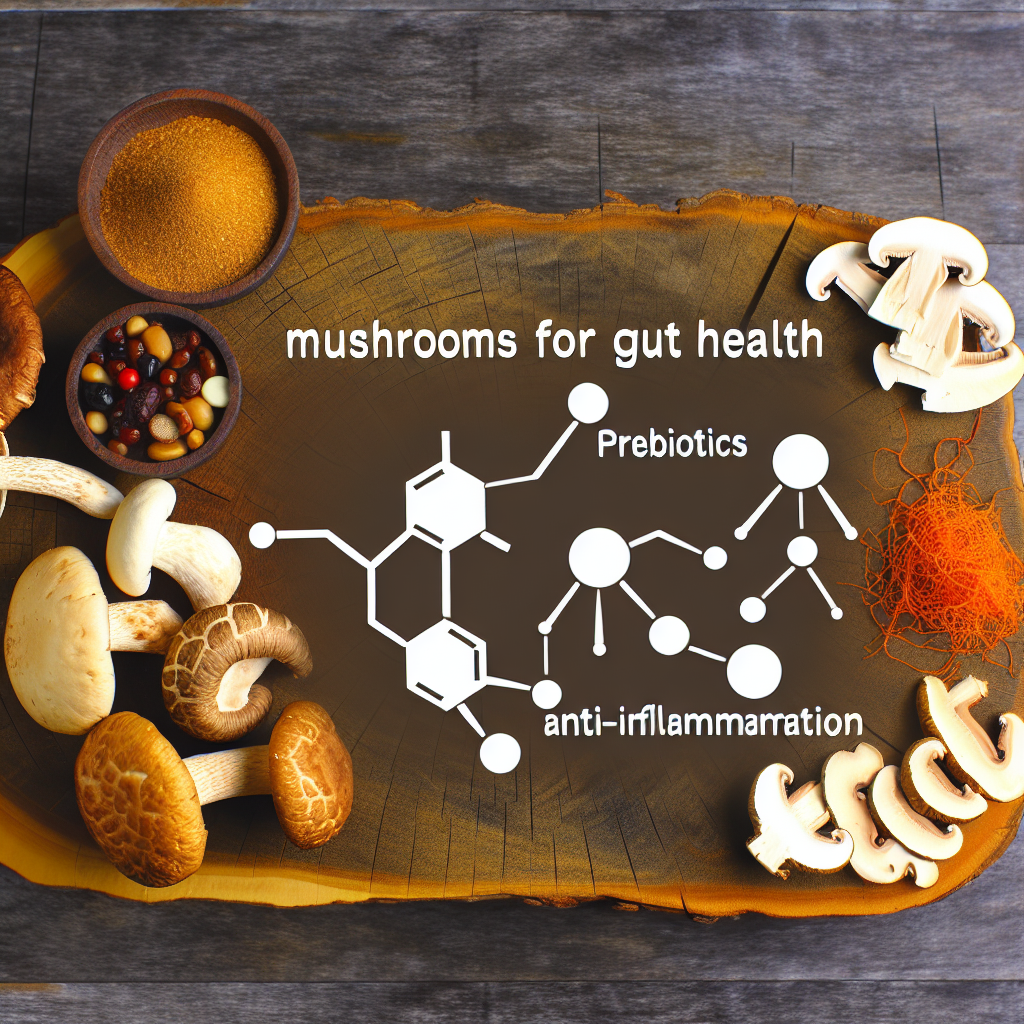Functional Mushrooms for Gut Health: Prebiotic and Anti-inflammatory Effects
Introduction
In recent years, functional mushrooms have gained widespread popularity for their impressive health benefits, especially concerning gut health. These powerful fungi are hailed for their adaptogenic capabilities and their ability to support digestion, immune regulation, and microbiome balance. People are increasingly exploring natural solutions for digestive issues, and mushrooms such as Lion’s Mane, Reishi, Turkey Tail, and Chaga are stepping into the spotlight due to their rich concentrations of bioactive compounds.
The human gut is home to trillions of microorganisms, collectively known as the microbiome, which plays a vital role in processes like nutrient absorption, immunity, inflammation regulation, and even mental well-being. Imbalances in this microbial ecosystem can lead to several health issues, including leaky gut syndrome, IBS (irritable bowel syndrome), and IBD (inflammatory bowel disease).
What sets functional mushrooms apart from culinary varieties is their nutrient-dense profile loaded with beta-glucans, polysaccharides, triterpenoids, and antioxidants, which together foster a healthier gut ecosystem. These compounds fuel beneficial bacteria (acting as prebiotics) and temper chronic inflammation, making them an excellent natural therapy for individuals with compromised digestive systems.
Turkey Tail mushrooms, for instance, are particularly rich in specific polysaccharides such as PSP and PSK, which increase microbial diversity by feeding probiotic strains. Reishi and Chaga mushrooms possess robust anti-inflammatory and antioxidative capacities that modulate immune function and soothe an overactive gut lining. Lion’s Mane is notable not only for its neurotrophic properties but also in enhancing mucosal integrity, protecting and healing stomach linings.
As functional mushrooms continue to be validated by science and integrated into functional medicine practices, they show promise not just as supportive supplements but as therapeutic agents. Whether in capsule form, tea, extract, or powder, incorporating these mushrooms can profoundly contribute to your digestive health and overall well-being, rooted in both ancient traditions and modern clinical insights.
Scientific Features and Studies
The evolving research on the gut microbiome has spurred a surge in studies focused on how functional mushrooms influence digestive and immune health. Chief among these studies are findings that highlight the prebiotic power of beta-glucans found in mushrooms such as Turkey Tail (Trametes versicolor) and Shiitake (Lentinula edodes). These soluble fibers reach the colon intact, where they create a favorable environment for the growth of beneficial bacterial strains like Bifidobacteria and Lactobacillus, key contributors to immune health, digestion, and mood balance via the gut-brain axis.
A benchmark 2017 study published in the International Journal of Molecular Sciences examined the effects of polysaccharopeptides (PSP) from Turkey Tail mushrooms. The study found that PSPs enhanced the structural integrity of the gut lining and stimulated gut-associated lymphoid tissues (GALT), crucial for immune cell activity in the intestines. Moreover, PSPs were shown to boost the production of short-chain fatty acids (SCFAs), which help regulate inflammation.
Reishi mushrooms (Ganoderma lucidum) are gaining recognition for their powerful anti-inflammatory effects, especially relevant for those suffering from IBD and similar disorders. A 2016 animal model study on colitis published in Evidence-Based Complementary and Alternative Medicine found that Reishi extracts alleviated colon inflammation and helped rebalance dysbiotic gut flora. This is largely attributed to its rich content of triterpenes and ganoderic acids, which suppress pro-inflammatory cytokines and modulate immune responses.
Additionally, Lion’s Mane (Hericium erinaceus) is being studied for more than just brain health. A 2013 study featured in the Journal of Ethnopharmacology demonstrated that Lion’s Mane extract supported the regeneration of gastric mucosa in injured stomach linings of animal models. This suggests its potential role in treating erosive conditions like ulcers and gastritis.
Meanwhile, Chaga (Inonotus obliquus) is rich in antioxidants and polysaccharides that combat oxidative stress—one of the major triggers for intestinal inflammation. Research examining Chaga’s effects, as discussed in Frontiers in Microbiology, suggests it also positively influences the composition of gut bacteria, encouraging a more favorable balance by suppressing harmful pathogens.
Overall, these findings provide compelling support for integrating **functional mushrooms** into treatment strategies for gastrointestinal health, as they not only nourish beneficial bacteria but actively restore immune function and mucosal integrity in the digestive tract.
Conclusion
Functional mushrooms represent a natural and holistic approach to supporting gut health in modern wellness routines. Rich in prebiotics, anti-inflammatory compounds, and immune-modulating polysaccharides, mushrooms like Reishi, Turkey Tail, Lion’s Mane, and Chaga offer multidimensional support for the digestive system. Whether you are managing a chronic condition or looking to enhance your digestive resilience, these mushrooms provide a science-backed, tradition-approved pathway to better health. As deeper studies continue to validate their benefits, these ancient fungi are proving to be essential tools in the modern quest for gut microbiome optimization and long-term wellness.
References
– International Journal of Molecular Sciences: The Immunomodulatory Effects of Polysaccharopeptides
– Journal of Ethnopharmacology: Gastroprotective effects of Lion’s Mane mushroom
– Evidence-Based Complementary and Alternative Medicine: Reishi mushroom treatment in colitis model
– Frontiers in Microbiology: Mushrooms as Prebiotic Sources
– NCBI: Review on Medicinal Mushrooms and Gut Health
For more insights about the powerful role of mushrooms in your wellness journey, stay connected with us at shroomfan.com.
Concise Summary
Functional mushrooms such as Reishi, Turkey Tail, Chaga, and Lion’s Mane support gut health through their prebiotic, anti-inflammatory, and immune-modulating properties. Rich in polysaccharides and beta-glucans, they promote microbial diversity, heal mucosal linings, and reduce gastrointestinal inflammation. Backed by both traditional use and emerging scientific studies, these mushrooms offer a natural way to enhance digestion, boost immunity, and maintain a balanced microbiome. As research continues to evolve, functional mushrooms are increasingly being recommended in nutritional and integrative health strategies for gut wellness.

Dominic E. is a passionate filmmaker navigating the exciting intersection of art and science. By day, he delves into the complexities of the human body as a full-time medical writer, meticulously translating intricate medical concepts into accessible and engaging narratives. By night, he explores the boundless realm of cinematic storytelling, crafting narratives that evoke emotion and challenge perspectives. Film Student and Full-time Medical Writer for ContentVendor.com




